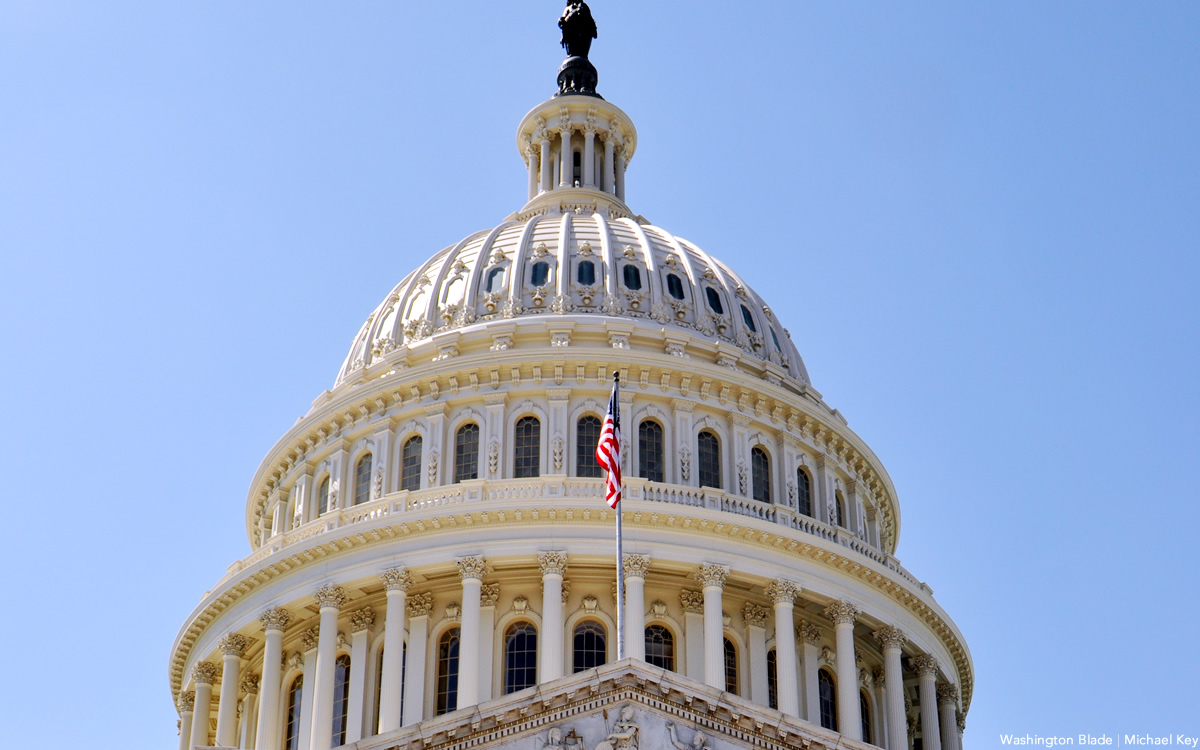2022 Midterm Elections
Defending democracy matters deeply for diverse older Americans
LGBTQ elders pushed for equal treatment

Congress adopted the Voting Rights Act in 1964 to ensure that Black Americans could effectively exercise the franchise. A year later, Congress adopted the Older Americans Act to ensure that our country’s older adults have the services they need to age in community and to prioritize older populations facing special challenges. Almost 60 years later, the back-to-back enactment of the Voting Rights Act and Older Americans Act seems prescient, given that the right to vote is under sustained attack, and that older Americans from diverse communities are some of those most at risk in the battle to save our country’s democracy.
A robust democracy is important to everyone, and particularly important for elders, from people of color and LGBTQ+ communities, many of whom are poor, rely on the public safety net for basic income and health care and depend on a functional government to meet its obligations.
Elders who are part of marginalized communities need more than just a stable status quo — their ability to age with health and dignity depends on equitably expanding the resources dedicated to their well-being, to strengthen public policies that ensure our communities have access to caregiving and elder services, and to build cultural competency and a commitment to equal access so that diverse elders can get the care and supports they need.
It’s not too much to ask that elders live their remaining years able to rely on long-established democratic norms like respect for our country’s legal institutions and the vote, and not have to worry about the roll-back of their rights and freedoms. Almost 8 million of our elders are veterans of World War II, the Korean War or the Vietnam War. They have worked tirelessly for decades in jobs great, menial and everything in between to build the wealthiest nation the world has ever known.
Older Americans are more likely to show up to vote than any other age group. Even though half of people 65 and older earn Social Security benefits of less than $15,000 per year, more than 20 percent of people 75 and older are still paying taxes. On top of all that, elders from diverse communities have made highly important contributions to expanding this country’s commitment to justice. For example, African American elders drove the country’s civil rights movement while LGBTQ+ older people have successfully pushed for much more equal treatment for same gender loving people in recent decades.
As elders enter their golden years, the democracy that they defended and contributed to seems to be unraveling. The alarming evidence is everywhere, including the refusal of our former president (and the majority of voters from his party) to accept the results of the 2020 elections and the violent and deadly assault on our nation’s capital by his followers on Jan. 6, 2021.
In many states, election deniers are running for office and volunteering as election workers with a declared intention to intimidate voters, discard votes, refuse to ratify results they don’t like, and impose rules that make it hard to vote. Reuters has identified over 100 threats of death or violence against poll workers; many experienced election workers are quitting, citing fear and stress.
In the face of the peril, defending democracy and the right to vote must be seen as essential aging issues. Progress needs to be made toward building justice, including passing bills like the Equality Act and the Ruthie and Connie LGBTQ Elder Americans Act and strengthening Social Security and Medicare and other protections and opportunities for elder people of color and migrant communities. But none of that will be possible if we can’t effectively use the vote to bring change; if state legislatures and Congress and the White House are permanently under the control of anti-democratic forces; if a politicized Supreme Court is controlled by the extreme right for a generation or more.
That’s why it’s time for older Americans to do everything possible to defend democracy and the right to vote.
We must stand up to the forces of authoritarianism by supporting efforts to protect fair elections where every person has an equal opportunity to vote. We must support proposals in Congress to strengthen our democratic institutions and we also must support efforts to hold to account those who illegally attack and undermine our democracy and elections. We must oppose efforts at censorship, book banning and other dangerous trends that make it harder to exchange ideas and advocate for change. We must join forces to protect and expand the rights of those who are most marginalized, including the rights of older Americans from diverse communities.
For diverse older Americans and those who care about them, the fight to save democracy and the vote must be our battle. We must join the fight, as we have joined so many before to make this country a better place to live. And we must win.
Michael Adams (he/him) is the chief executive officer of SAGE.
2022 Midterm Elections
Republicans gain control of the U.S. House
Narrow GOP majority could bode well for blocking anti-LGBTQ bills.

Certainty over Republicans’ control of the U.S. House of Representatives crystalized on Tuesday, while Senate Minority Leader Mitch McConnell (R-Ky.) fended off a bid for his position by fellow GOP Sen. Rick Scott (Fla.).
As the final votes from last week’s midterm elections continue to trickle in, by Wednesday evening it became clear that when the 118th Congress is seated in January, the legislature will be divided between the House and the U.S. Senate, where Democrats will either retain their 50-vote majority or win an extra seat, pending the results of Georgia’s runoff election in December.
It is the House, too, that will be divided, as the majority’s shift from blue to red was narrowly won, with only seven races whose results have not yet been tallied. Republicans’ control of the chamber comes with 218 seats, a feat they accomplished today. By 7:40 p.m. ET, Democrats had won 210 seats.
Leadership in both chambers has also been decided. House Minority Leader Kevin McCarthy (R-Calif.) is poised to take over as House Speaker in January when the new Congress meets. McConnell, meanwhile, prevailed over a challenge for his Senate leadership by Scott, his Republican colleague.
“With a small Republican majority, we think there’s a greater chance of blocking anti-gay and anti-trans bills, which may now not even be brought up for a vote,” Geoff Wetrosky, campaign director for the Human Rights Campaign, told the Washington Blade by phone on Tuesday.
“Not only because of the composition of Congress, but also because last week’s election made clear that voters do not support this kind of extremism,” Wetrosky said.
Annise Parker, president of the LGBTQ Victory Fund, told the Blade by phone on Tuesday that “the first six months will be spent in internal warfare, but it’s clear that there won’t be anything positive coming out of the House for our community.”
There “very well may be negative bills,” Parker added, noting that with a slim majority in the lower chamber, there is unlikely to be much legislation, period.
2022 Midterm Elections
Democrats retain control of the U.S. Senate
Catherine Cortez Masto won reelection in Nev.

Control of the U.S. Senate will remain in the hands of Democrats after U.S. Sen. Catherine Cortez Masto (D-Nev.) defeated Republican Adam Laxalt, the state’s former attorney general, in a hotly contested race.
The 58-year-old Cortez Masto has been serving as the senior U.S. senator from Nevada since 2017. Previously she was the state’s 32nd attorney general from 2007-2015.
Her reelection means that President Joe Biden maintains his ability to confirm judicial nominees and Cabinet secretaries. All eyes are now on the U.S. House of Representatives where the balance of power is at stake.
David Wasserman, a House campaign analyst with the nonpartisan Cook Political Report, told the Los Angeles Times Saturday that “it will absolutely come down to California,” which the Golden State’s 10 Congressional races are deemed most at risk of flipping and still too close to call.
Cortez Masto, the first Latina elected to the Senate, endured a tough reelection campaign made more protracted after the mail-in ballot counting with the results resting largely with the state’s most populous county, Clark County, home to Las Vegas, which posted updates once a day since Tuesday.
Thank you, Nevada! pic.twitter.com/NORNR52wp8
— Catherine Cortez Masto (@CortezMasto) November 13, 2022
NBC News reported that in the campaign’s closing days, Laxalt, a MAGA Trump loyalist who drew the former president as well as Donald Trump, Jr., to the state to stump for him, hammered a strict partisan message, vowing not to work with the left and promising to hold Senate hearings examining Biden’s top medical adviser Anthony Fauci and Biden’s son, Hunter Biden.
Laxalt had also questioned the results of the 2020 election, even saying the results were “rigged.”
“There should be consequences for people who undermine our democracy, who peddle the ‘big lie’ and conspiracy theories,” Cortez Masto said at an event in Reno, the state’s second largest city, in October.
Laxalt handily won the state’s 15 rural counties, in some counties winning 80 percent of the vote, while Cortez Masto steadily led the reliably blue Clark County.
Speaking in the Cambodian capital city of Phnom Penh, where he is attending the East Asia Summit, Joe Biden finished his remarks and then took a couple questions from reporters. When asked about the news of the Democrats retaining the Senate after Cortez Masto’s reelection victory the president said: “I feel good and I’m looking forward to the next couple years.”
In the press pool traveling with Biden, The Washington Post’s White House reporter Yasmeen Abutaleb, reported that the president made congratulatory calls to Cortez Masto at 10:08 a.m. local time and Senate Majority Leader Chuck Schumer (D-N.Y.) at 10:28 a.m. local time, (Cambodia.)
The president added that as he congratulated Schumer he noted their [Democrats] focus now is on Georgia.
“I’m not surprised by this … I think it’s a reflection of the quality of our candidates,” Biden said.
“It’s always better at 51,” he added and mentioned that with 51, Democrats don’t need to have an even makeup of committees. “It’s just simply better.”
“Republicans are going to have to decide who they are,” the president reflected.
2022 Midterm Elections
Trone wins reelection in Md. 6th Congressional District
Incumbent Democrat beat state Rep. Neil Parrott (R-Frederick County)

Maryland Congressman David Trone has defeated his Republican challenger in the state’s 6th Congressional District.
Trone defeated state Del. Neil Parrott (R-Frederick County) by a 50.38-49.5 percent margin.
The Frederick County Republican had been ahead of the incumbent Democratic, in part, because the boundaries of the district, which includes all of western Maryland, had been redrawn during the last redistricting. Mail-in ballots had yet to be counted when Parrott was ahead of Trone immediately after Election Day.
“I want to thank Del. Parrott for his phone call this afternoon conceding the race,” said Trone in a tweet. “My promise to him, and to all of the people of the 6th District, is this: I’ll continue to work across the aisle to deliver results and get things done. Thank you, Maryland! Let’s get back to work.”
I want to thank Del. Parrott for his phone call this afternoon conceding the race. My promise to him, and to all of the people of the 6th District, is this: I’ll continue to work across the aisle to deliver results and get things done. Thank you, Maryland! Let’s get back to work.
— David Trone (@davidjtrone) November 11, 2022
-

 U.S. Supreme Court2 days ago
U.S. Supreme Court2 days agoSupreme Court to consider bans on trans athletes in school sports
-

 Out & About2 days ago
Out & About2 days agoCelebrate the Fourth of July the gay way!
-

 Virginia2 days ago
Virginia2 days agoVa. court allows conversion therapy despite law banning it
-

 Maryland4 days ago
Maryland4 days agoLGBTQ suicide prevention hotline option is going away. Here’s where else to go in Md.












